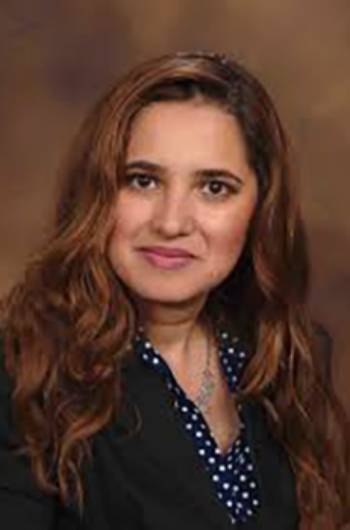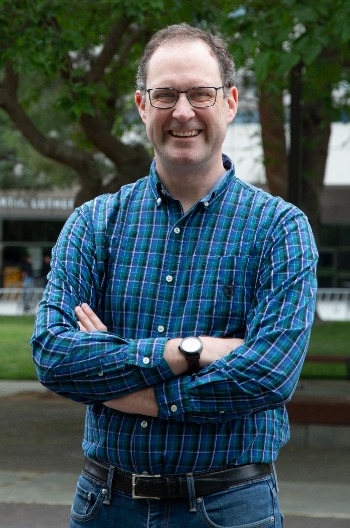RSCA in Five: Faculty Short Talks on the CHIPS and Science Act
The CHIPS and Science Act, signed into law in 2022, aims to catalyze domestic semiconductor research and manufacturing. Please join SJSU faculty as they discuss how their research intersects with this historic act and potential implications for Silicon Valley, its economy, and the development of an informed citizenry and highly skilled workforce.
When: Friday, May 10, 2024, from 11:00 a.m. to 1:00 p.m.
Where: MLK 225
Format: One-hour program with lunch and networking thereafter
Register for the event on our RSVP form.
SJSU welcomes the following faculty who will be presenting their research.
 Behin Elahi
Behin Elahi
Talk Title: TBD
Dr. Behin Elahi joined SJSU as an Associate Professor in the Department of Industrial and Systems Engineering in Fall 2023. Prior to joining SJSU, she was Associate Professor at Purdue University, Fort Wayne (2016-2023). She was a consultant and project manager of the Business Waste Reduction Assistance Program (BWRAP), a partnership between the Environmental Protection Agency (EPA), University of Toledo, and Lucas County in Ohio (2012-2016).
Her research interests include application of robotics and virtual reality in manufacturing
systems, human-robot interaction and collaboration, data mining, machine learning,
optimization of healthcare systems, operations
research, decision making algorithms, supply chain optimization, lean manufacturing,
water quality assessments, modeling and simulation of complex systems such as healthcare
systems and automated manufacturing systems.
Education
- Ph.D., Industrial Engineering, University of Toledo
Research
Areas of Interest/Keywords
Operations Research, Industrial IoT & Robotics, Supply Chain Planning, Quality Control & Healthcare
Recent Publications
Elahi, Tokaldany, “Application of Internet of Things-Aided Simulation and Digital Twin Technology in Smart Manufacturing”, in Advances in Mathematics for Industry 4.0, edited by Ram, M., publisher: Academic Press, Elsevier, p.p. 335-359, 2020.
Elahi, Alasti, and Mohammadpour. "Application of proximity sensors to enhance ambient awareness for a six-axis robot arm." Proceedings of International Annual Conference on Mechatronic Sensors, Resistivity, and Resistance (ICMSRR 2020), Boston, MA. 2020.
Alasti, Elahi, Mohammadpour, “Risk-Preventative Workforce Training Using Virtual Reality in Automated Robotic Sites” in Simulation for Industry 4.0, Past, Present, and Future, edited by Gunal, M., publisher: Springer, 2019.
 Jason Kim
Jason Kim
Industry Resesarch Alliances Specialist, SJSU
Jason Kim is the Industry Research Alliances Specialist in the Office of Innovation at San José State University. In this role, he supports the university’s industry research portfolio and partnership development with industry collaborators. He is the point of contact for SJSU’s institutional membership with the NextFlex consortium. He received his Ph.D. and M.A. from Northwestern University and his B.S. from Emory University, having trained as a cognitive and behavioral neuroscientist in speech and hearing sciences.
 Christopher Smallwood
Christopher Smallwood
Talk Title: Optical characterization of Semiconductor Nanostructures
Christopher Smallwood is an assistant professor in the Department of Physics and Astronomy at San José State University (SJSU), where he runs an experimental research group investigating optical properties of solid-state materials. He received an AB in Physics from Harvard College in 2005 where he conducted precision measurements of atomic rubidium vapor, and he received a PhD in Physics from UC Berkeley in 2014 where he developed techniques in time- and angle-resolved photoemission spectroscopy to study high-temperature superconductors. He spent two years as a postdoctoral research associate at JILA (University of Colorado and the National Institute of Standards and Technology) from 2014–2016 and two years as a postdoctoral research fellow in the Department of Physics at the University of Michigan from 2016–2018, where he specialized in using ultrafast spectroscopy techniques to study light-matter interactions in solid-state media. Between college and graduate school, he also taught fifth grade from 2005–2007 with Teach For America at Leo James Leo Elementary School in Mission, TX. Smallwood is the recipient of awards including the 2013 Lars Commins Memorial Award in Experimental Physics at UC Berkeley (awarded to only one graduate student per year at the university), and he was honored in 2024 at SJSU's annual Author and Artist Celebration for his recently published textbook, "Optical Multidimensional Coherent Spectroscopy."
Education
- Ph.D., Physics, UC Berkeley
Research
Areas of Interest/Keywords
Optical Spectroscopy, Materials Science, Quantum Information, Condensed Matter Physics
Recent Publications
Li, Hebin, Lomsadze, Moody, Smallwood, and Cundiff. Optical Multidimensional Coherent Spectroscopy. United Kingdom, Oxford University Press, 2023. ISBN 978-0-19-284386-9
Melody, Patel, Nguyen, and Smallwood. Low-cost quadrature optical interferometer. American Journal of Physics 91.2 (2023): 132-141. https://doi.org/10.1119/5.0110405
Smallwood, et al. Hidden silicon-vacancy centers in diamond. Physical Review Letters 126.21 (2021): 213601. https://doi.org/10.1103/PhysRevLett.126.213601
 Yun Wang
Yun Wang
Talk Title: Biosensors for Healthcare and Food Safety
Yun Wang is an Assistant Professor of Biomedical Engineering. The major goal of her research is to ensure public health through novel detection and diagnosis approaches, especially biosensors. Her research mainly focuses on rapid disease diagnosis, biosystem monitoring, disease-causing agent detection, product safety assurance, and genetic study of pathogens and diseases. Her recent work investigates new biosensing technologies and develops novel biosensors for medical, biological, and environmental applications, which are multifunctional, user-friendly, and cost- and time-effective. Dr. Wang worked as a research biochemist at the US Food and Drug Administration before joining SJSU. She received her Ph.D. in Biosystems Engineering from Michigan State University in 2014, and M.S. in Biological Engineering from the University of Arkansas in 2008.
Education
- Ph.D., Biosystems Engineering, Michigan State University
Research
Areas of Interest/Keywords
Biosensors, Disease Diagnosis, Food/Water Safety, Nanotechnology
Recent Publications
Nanthakumar, Deshpande, and Wang. “Self-powered Biosensor for Rapid Pathogen Detection”. National BMES (Biomedical Engineering Society) Annual Meeting, Oct. 2023.
Wang, Schill, Fry, and Duncan. 2020. A Quantum Dot Nanobiosensor for Rapid Detection of Botulinum Neurotoxin Serotype E. ACS Sensors. 5 (7), 2118-2127.
Wang, Fewins and Alocilja. 2015. Electrochemical Immunosensor Using Nanoparticle-based Signal Enhancement for Escherichia coli O157:H7 Detection. Sensors Journal, IEEE 15(8): 4692-4699.